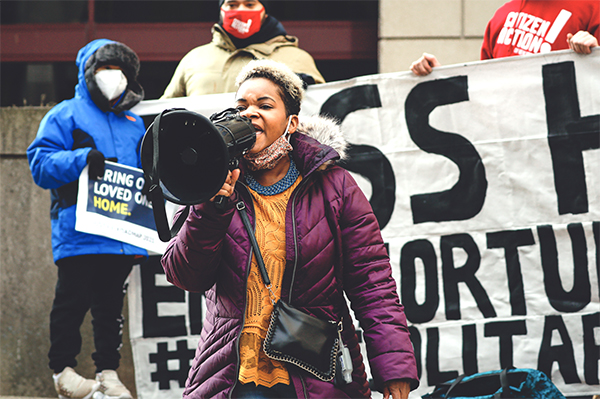India Walton was born and raised on the impoverished East Side of Buffalo, New York, one of six children. On June 22, she stunned the political world by winning the Democratic nomination for mayor of Buffalo, defeating Byron Brown, a four-term incumbent seeking a fifth term.
Walton’s victory in an overwhelmingly Democratic city of 250,000 people means she will almost certainly become Buffalo’s next mayor. That will make her the first Black woman to ever be mayor of Buffalo and the first self-described socialist to be the mayor of a major American city since 1960.
Walton had her first child at 14, and gave birth to extremely premature twins at 19, two boys who had to spend six months in the hospital. The experience inspired her to become a registered nurse in the same newborn intensive care unit where her sons’ lives were saved. “I wanted to go to nursing school so that I could return to the NICU and be an example for another young mother who may be in a time of crisis similar to what I experienced,” she told a columnist for The New York Times. One newspaper account of her victory described Walton’s life as being “defined by hardship” — a single mother at the age of 14, a high school dropout (who got her GED at 19), resident of a group home, and a victim of domestic violence.
Walton’s campaign forged a multiracial coalition which drew on the extensive ties she has developed over the years in her work as a union and community activist. She was a union representative with Local 1199 of the Service Employees International Union and the executive director of a community land trust on the city’s East Side near downtown. Endorsed by the Democratic Socialists of America and the Working Families Party, Walton’s campaign emphasized small donors, grassroots fundraising, door knocking, and extensive phone banking.
An organizer for activist groups that supported New York state’s bail reforms, Walton marched in the protests that followed the murder of George Floyd one year ago. She decided to run because the incumbent mayor failed to implement meaningful reforms at the Buffalo Police Department and because of his poor response to the coronavirus crisis.
Walton told a columnist for The New York Times:
“[W]e say we’re going to reallocate funds. We’re going to fully fund community centers. We’re going to make the investments that naturally reduce crime, such as investments in education, infrastructure, living-wage jobs. Nothing stops crime better than a person who is gainfully employed.”
Asked to describe her vision for a new Buffalo, Walton told Jacobin magazine:
“The Buffalo that I envision is one free from militarized and hostile policing, one where there’s ample and truly affordable housing, where there are opportunities for collective ownership and cooperative employment, where folks are working for organizations that they have an ownership stake in. I want to live in a deeply democratic city where all voices are heard, including those who are not able to vote, whether it’s because of their age or their immigration status. The leadership of this city should govern everyone who lives here.
“So my dream for Buffalo is just that: a state of deep democracy and co-governance where everyone is valued and can thrive.”
Walton’s grassroots campaign involved scores of volunteers. It defeated incumbent Mayor Brown despite his million-dollar war chest and the fact that Brown had the endorsement of the Erie County Democratic Committee, numerous elected officials, and some powerful construction unions. Asked by Jacobin magazine before the primary about her views on the Democratic Party, Walton said:
“We have to send a strong and clear message that we’re not okay with the status quo anymore. We are strong enough to overcome the entrenched Democratic Party that is keeping us from the progress that we all know we really need.
“There is a wave of progressive candidates moving across the state, across the country. I think a lot of establishment Democrats thought that places like Buffalo and Rochester would be last to see such candidates arise, but it’s catching on quicker than expected.”
After her primary victory, Walton had this to say:
“This victory is ours. It is the first of many. If you are in an elected office right now, you are being put on notice. We are coming.”
Chris Mahin is a writer, speaker and teacher on contemporary U.S. politics and history, particularly on the significance of the American Revolutionary War and Civil war eras for today. He is the Electoral Desk on the People’s Tribune Editorial Board.

